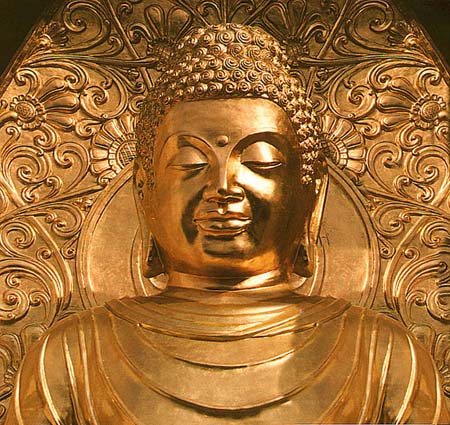The Buddha meets with a man named Saccaka and discusses his awakening. From The Greater Discourse to Saccaka, which narrates the Buddha’s way to liberation.

I recall that when my father the Sakyan was occupied, while I was sitting in the cool shade of a rose-apple tree, quite secluded from sensual pleasures, secluded from unwholesome states, I entered upon and abided in the first jhana, which is accompanied by applied and sustained thought, with rapture and pleasure born of seclusion. Could that be the path to enlightenment?’ Then, following on that memory, came the realization: ‘That is the path to enlightenment.”
I have included this quote for a few reasons. Firstly, it reminds us, the process of awakening has been happening for a long time. We are not the first person to go through an awakening. My personal philosophy to awakening research requires the study of a number of wise individuals, those who’s guidance has been handed down for thousands of years. It has stayed relevant because it helps us in any epoch.
I should note. I do not belong to any particular religion, I simply look to various sources who would be considered experts on relevant subjects.
The quote also gives us some of the components we need for enlightenment. The ancient texts discussed on this site are of a distinctly different way of thinking, quite removed from normal western thought. Particularly texts translated from Sanskrit; this can present people with a barrier, how can I understand the points being made in ancient texts? My hope, is, to explain key points in an easy to follow format. Let us use the above quote as an example.
Ingredient 1: “I was sitting in the cool shade of a rose-apple tree.”
Here the point is made about being outside in nature.
Ingredient 2: “quite secluded from sensual pleasures”
Not distracted by “Something that is sensual gives pleasure to your physical senses rather than to your mind.”
Ingredient 3: “secluded from unwholesome states”
This one is a bit more complicated, and a large part of the inner work we need for growth. In a nutshell.
Bhikkhu Bodhi states:
Unwholesome consciousness is consciousness accompanied by one or another of the three unwholesome roots—greed, hatred, and delusion. Such consciousness is called unwholesome because it is mentally unhealthy, morally blameworthy, and productive of painful results.”
Simply put, we need to free our mind of negative thoughts and be mindful.
More information on the Fourteen unwholesome mental factors here
Ingredient 4: “I entered upon and abided in the first jhana”
Jhana is sometimes simply translated as “meditation,” but more accurately refers to an “absorption” into a very focused, very stable state of concentration. In the classical tradition there are several stages of jhana, each one more focused than the previous.”
Instructions for Entering Jhana …Leigh Brasington
Ingredient 5: “which is accompanied by applied and sustained thought.”
Applied thought is a thought like “I will count the breath”.
Sustained thought is the actual counting, One. Two. Three.
Ingredient 6: “with rapture.”
Simply put, he carrying of a person to another place or sphere of existence.
Ingredient 7: “and pleasure born of seclusion.”
Solitude to concentrate without interruption.
“Could that be the path to enlightenment?’ Then, following on that memory, came the realization: ‘That is the path to enlightenment.”
The above example does highlight how much inner work is needed. It also gives us a recipe. Most of us can’t expect to accomplish everything listed here overnight. A simple rule of thumb is, try to do a little better each day and enjoy the journey. Each little step of inner progress will reward us in many beautiful ways. At least we now have an idea of the steps needed and the goal.